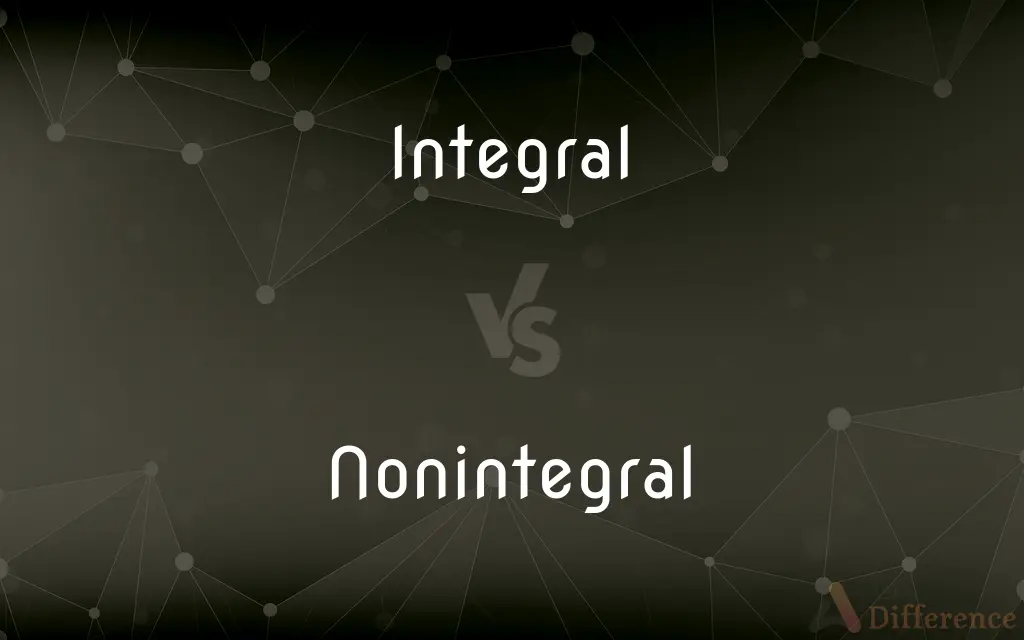Integral vs. Nonintegral — What's the Difference?
Edited by Tayyaba Rehman — By Fiza Rafique — Updated on March 29, 2024
Integral components are essential and necessary parts of a whole, while nonintegral elements are not essential and can be excluded without losing the whole's functionality or identity.

Difference Between Integral and Nonintegral
Table of Contents
ADVERTISEMENT
Key Differences
Integral parts or features are considered fundamental to the structure, function, or nature of something, implying that their absence would significantly alter or impair the whole. For example, the processor is an integral part of a computer, necessary for its operation. On the other hand, nonintegral components, while they may add value or functionality, are not essential. For instance, a computer's external webcam is nonintegral; its absence does not prevent the computer from performing its primary functions.
When it comes to systems or processes, integral components are those without which the system would fail to achieve its intended purpose or operate correctly. These components are often central to the design or function of the system. In contrast, nonintegral parts of a system may enhance performance or add convenience but are not critical for basic operation. This distinction is crucial in engineering and design, where understanding which components are integral can dictate priorities in development and maintenance.
In mathematics, the term "integral" also refers to a fundamental concept in calculus that represents the area under a curve or the accumulation of quantities. This meaning highlights the importance or necessity of integration in understanding and solving various mathematical problems. Conversely, nonintegral, in this context, does not directly apply but can refer to concepts or elements outside of integration that are not essential to the immediate mathematical investigation or solution.
In literature and art, an integral theme or element is one that is central to the understanding, interpretation, or value of a work. It is so embedded in the fabric of the work that its removal would diminish its integrity or meaning. Nonintegral themes or elements, while possibly enriching the work, do not hold this level of importance and their exclusion would not fundamentally alter the work’s core message or value.
The usage of integral and nonintegral can also extend to roles within organizations or teams. Integral roles are those critical to the organization's mission and operations, where individuals in these positions have responsibilities that are central to the functioning and success of the organization. Nonintegral roles, though they may contribute to efficiency or morale, are not crucial for the basic operational viability of the organization.
ADVERTISEMENT
Comparison Chart
Necessity
Essential for function or identity
Not essential; can be excluded
Impact
Absence significantly alters the whole
Absence has minimal impact
Examples
Processor in a computer
External webcam for a computer
In Systems
Critical for operation
Enhances performance or convenience
In Mathematics
Fundamental concept (e.g., area under a curve)
Not directly applicable
Compare with Definitions
Integral
Necessary to make a whole complete.
An engine is integral to the operation of a car.
Nonintegral
Apart from the essential nature of something.
Optional features are nonintegral to the basic operation of software.
Integral
Being an essential part of something.
Trust is integral to a successful partnership.
Nonintegral
Not necessary or essential for completeness.
A decorative case is nonintegral to a smartphone's function.
Integral
Necessary for completeness.
Practice is integral to mastering a skill.
Nonintegral
Not central or fundamental.
Peripheral devices are often nonintegral to a computer's core functions.
Integral
Constituting the entirety of something.
The integral features of a smartphone include its CPU and operating system.
Nonintegral
Not constituting a necessary element of a whole.
Background music is nonintegral to the functionality of most apps.
Integral
Fundamental or central to the nature of something.
Integrity is integral to good leadership.
Nonintegral
Can be excluded without affecting the whole significantly.
A car's paint color is nonintegral to its performance.
Integral
In mathematics, an integral assigns numbers to functions in a way that describes displacement, area, volume, and other concepts that arise by combining infinitesimal data. The process of finding integrals is called integration.
Nonintegral
(mathematics) Not integral.
Integral
Necessary to make a whole complete; essential or fundamental
Games are an integral part of the school's curriculum
Systematic training should be integral to library management
Integral
Of or denoted by an integer.
Integral
A function of which a given function is the derivative, i.e. which yields that function when differentiated, and which may express the area under the curve of a graph of the function.
Integral
Essential or necessary for completeness; constituent
The kitchen is an integral part of a house.
Integral
Possessing everything essential; entire.
Integral
Expressed or expressible as or in terms of integers.
Integral
Expressed as or involving integrals.
Integral
A complete unit; a whole.
Integral
A number computed by a limiting process in which the domain of a function, often an interval or planar region, is divided into arbitrarily small units, the value of the function at a point in each unit is multiplied by the linear or areal measurement of that unit, and all such products are summed.
Integral
A definite integral.
Integral
An indefinite integral.
Integral
Constituting a whole together with other parts or factors; not omittable or removable
Integral
(mathematics) Of, pertaining to, or being an integer.
Integral
(mathematics) Relating to integration.
Integral
(obsolete) Whole; undamaged.
Integral
(mathematics) One of the two fundamental operations of calculus (the other being differentiation), whereby a function's displacement, area, volume, or other qualities arising from the study of infinitesimal change are quantified, usually defined as a limiting process on a sequence of partial sums. Denoted using a long s: ∫, or a variant thereof.
The integral of a univariate real-valued function is the area under its curve; but be warned! Not all functions are integrable!
Integral
(specifically) Any of several analytic formalizations of this operation: the Riemann integral, the Lebesgue integral, etc.
Integral
(mathematics) A definite integral: the result of the application of such an operation onto a function and a suitable subset of the function's domain: either a number or positive or negative infinity. In the former case, the integral is said to be finite or to converge; in the latter, the integral is said to diverge. In notation, the domain of integration is indicated either below the sign, or, if it is an interval, with its endpoints as sub- and super-scripts, and the function being integrated forming part of the integrand (or, generally, differential form) appearing in front of the integral sign.
The integral of on is , but the integral of the same function on diverges. In notation, , but .
Integral
(mathematics) An indefinite integral: the result of the application of such an operation onto a function together with an indefinite domain, yielding a function; a function's antiderivative;
The integral of is plus a constant.
Integral
The fluent of a given fluxion in Newtonian calculus.
Integral
Lacking nothing of completeness; complete; perfect; uninjured; whole; entire.
A local motion keepeth bodies integral.
Integral
Essential to completeness; constituent, as a part; pertaining to, or serving to form, an integer; integrant.
Ceasing to do evil, and doing good, are the two great integral parts that complete this duty.
Integral
Of, pertaining to, or being, a whole number or undivided quantity; not fractional.
Integral
A whole; an entire thing; a whole number; an individual.
Integral
An expression which, being differentiated, will produce a given differential. See differential Differential, and Integration. Cf. Fluent.
Integral
The result of a mathematical integration; F(x) is the integral of f(x) if dF/dx = f(x)
Integral
Existing as an essential constituent or characteristic;
The Ptolemaic system with its built-in concept of periodicity
A constitutional inability to tell the truth
Integral
Constituting the undiminished entirety; lacking nothing essential especially not damaged;
A local motion keepeth bodies integral
Was able to keep the collection entire during his lifetime
Fought to keep the union intact
Common Curiosities
Why is understanding the difference between integral and nonintegral important in systems design?
It helps in prioritizing components for development, maintenance, and resource allocation, ensuring that essential parts are given precedence.
What makes a component integral?
A component is integral if it is essential to the function, operation, or identity of a whole, such that its absence would significantly alter or impair the whole.
Can a role within an organization be both integral and nonintegral?
A role might have aspects that are integral and others that are nonintegral, but roles themselves are generally categorized based on their core responsibilities.
Can a nonintegral part become integral?
Yes, through changes in design, function, or user needs, a nonintegral part can become integral.
Can the absence of a nonintegral part affect the performance of a system?
While it may affect performance or convenience, it does not compromise the system's basic functionality or purpose.
Is it possible for something to be integral in one context and nonintegral in another?
Yes, the context or framework in which something is considered can determine whether it is seen as integral or nonintegral.
Are all aesthetic elements considered nonintegral?
Generally, yes, unless the aesthetic element is central to the identity or functionality of the item, as might be the case in design-centric products.
How is the concept of integral applied in mathematics?
It refers to integration, a core concept in calculus essential for calculating areas under curves and solving differential equations.
How do integral and nonintegral parts differ in importance?
Integral parts are crucial for functionality or completeness, while nonintegral parts are less important and can be removed without significant impact.
Are integral parts always more expensive or complex?
Not necessarily. Integral parts are defined by their necessity, not their cost or complexity.
How do integral and nonintegral concepts apply to team dynamics?
In teams, integral roles are critical to achieving objectives, while nonintegral roles may support team cohesion or provide supplementary skills.
How do integral elements influence the design process?
Integral elements are prioritized in the design process to ensure the system or product meets its essential functions and objectives.
Can the significance of integral and nonintegral parts change over time?
Yes, as technologies evolve and user needs change, the significance of parts can shift between integral and nonintegral.
Is there a clear boundary between integral and nonintegral elements?
While guidelines exist, the distinction can sometimes be subjective and dependent on specific circumstances or perspectives.
How does the distinction between integral and nonintegral affect project management?
It helps in setting priorities, allocating resources effectively, and managing risks by focusing on essential components.
Share Your Discovery

Previous Comparison
Mouse vs. Chinchilla
Next Comparison
Dispatch vs. ScheduleAuthor Spotlight
Written by
Fiza RafiqueFiza Rafique is a skilled content writer at AskDifference.com, where she meticulously refines and enhances written pieces. Drawing from her vast editorial expertise, Fiza ensures clarity, accuracy, and precision in every article. Passionate about language, she continually seeks to elevate the quality of content for readers worldwide.
Edited by
Tayyaba RehmanTayyaba Rehman is a distinguished writer, currently serving as a primary contributor to askdifference.com. As a researcher in semantics and etymology, Tayyaba's passion for the complexity of languages and their distinctions has found a perfect home on the platform. Tayyaba delves into the intricacies of language, distinguishing between commonly confused words and phrases, thereby providing clarity for readers worldwide.















































